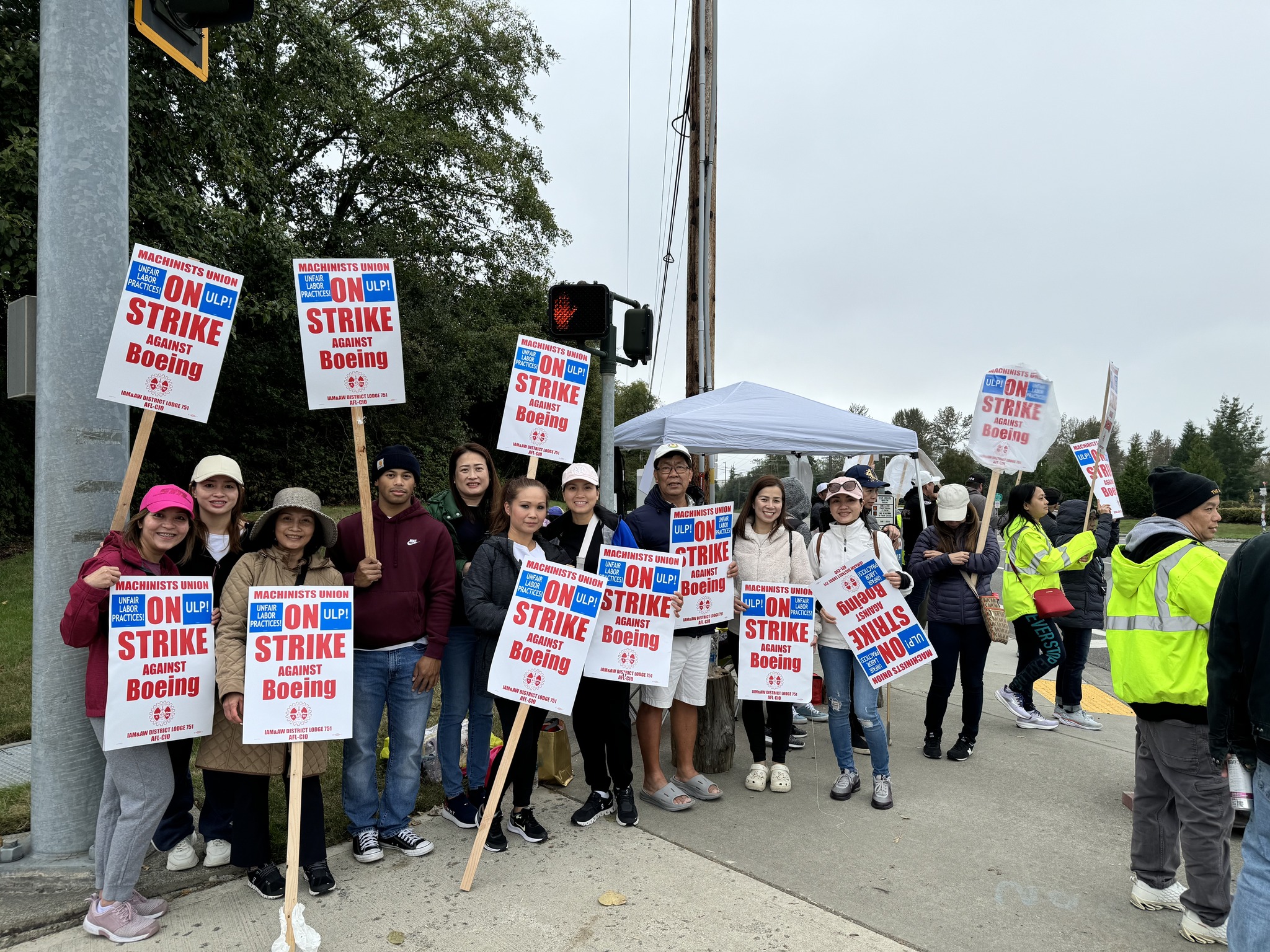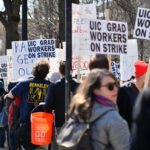Malik Miah
Posted October 26, 2024

UPDATE: LEADERS OF THE International Association of Machinists and Aerospace Workers (IAMAW) District 751 in Seattle said 59% of members who cast ballots November 4 agreed to approve the fourth formal offer (and the third put to a vote). It ended a seven-week strike. The October 31 deal was backed by the union leadership.
“It’s time for us to come together. This is a victory,” IAM District 751 President Jon Holden told members while announcing the tally late Monday. “You stood strong, and you stood tall, and you won.”
The district leaders had endorsed the latest proposal, saying they thought they had gotten all they could though negotiations and the strike. Along with the wage increase of 38% over four years, the new contract gives each worker a $12,000 ratification bonus (up from the first offer of $3000) and retains a performance bonus the company wanted to eliminate.
A key demand to restore the frozen pension — given up in 2014 — was rejected by Boeing. The company didn’t agree to cost-free health care benefits either.
Reactions were mixed even among union members who voted to accept the contract.
Jim Schell, a striker in the Columbia Basin, did not see even the latest contract as meeting members’ needs:
“We’ve been out here fighting for our pension and better health care costs, and they seem to only care about trying to give us more money, which, yeah, that’s great, especially for those that aren’t maxed out, but they stole our pension 10 years ago, and that’s the bottom line, they stole it from us, and so we’ve been out here fighting to get it back.”
Seattle-based calibration specialist Eep Bolaño, who voted “yes,” maintained that she and fellow workers made a wise but infuriating choice to accept the offer.
“We were threatened by a company that was crippled, dying, bleeding on the ground, and us as one of the biggest unions in the country couldn’t even extract two-thirds of our demands from them. This is humiliating.”
Other workers like William Gardiner, a lab lead in calibration services, saw the revised offer a cause for celebration. “I’m extremely pumped over this vote,” said Gardiner, who has worked for Boeing for 13 years. “We didn’t fix everything — that’s OK. Overall, it’s a positive contract.”
President Joe Biden congratulated the machinists and Boeing for coming to an agreement. He said the contract is important for Boeing’s future as “a critical part of America’s aerospace sector.”
BOEING’s LARGEST UNION, the International Association of Machinists and Aerospace Workers (IAM), rejected a tentative labor contract on October 13 by a wide margin, extending their powerful strike. The majority “No” vote extends a nearly six-week long strike at facilities where the company makes its best-selling commercial plane.
Given the November 5 presidential election, this is a setback for the Biden administration, which sent its Acting Labor Secretary in order to get a deal before then.
Deep Mistrust and Determination
The contract, the second that workers have voted down, was opposed by 64% of those voting, according to the union. The union represents about 33,000 workers.
“There’s much more work to do. We will push to get back to the table, we will push for the members’ demands as quickly as we can,” said Jon Holden, president of District 751 of the union, which represents the vast majority of the workers and has led in the talks. He delivered that message at the union’s Seattle headquarters to a room of members chanting, “Fight, fight.”
At the main voting location outside of Seattle, a few strikers held signs urging a “No” vote. Others passed out flyers calling for a “No” vote.
“No Pensions, No Planes”
Machinists at Boeing can start at $20 an hour — just above the area’s minimum, so strikers saw the company’s offer of a 35% wage over four years was inadequate. They demand 40%.
More importantly, they demand the restoration of the defined benefit pension frozen a decade ago. Many workers have spoken about how frustrated they are by the lost pension, which was replaced by a 401k plan dependent on the ups and downs of Wall Street.
The rejected offer included a $7,000 one-time bonus (up from the first offer of $3,000) and additional contributions to the health care and 401k plans. It also would have preserved a union-wide incentive bonus program that would not be less than an annual four percent of their wages. But if the second offer was better than the first one members rejected, it still wasn’t good enough.
By threatening to move more work away from the Puget Sound area a decade ago, Boeing blackmailed the union into an agreement that not only eliminated pensions but shifted health care costs and led to stagnating wages. As Jon Holden, wrote in a statement after the vote, “This contract struggle began over ten years ago when the company overreached and created a wound that may never heal for many members.”
He continued “I don’t have to tell you all how challenging it has been for our membership through the pandemic, the crashes, massive inflation, and the need to address the losses stemming from the 2014 contract.”
Another issue is Boeing’s extensive use of overtime, The just rejected contract banned a second consecutive weekend of mandatory overtime, and limited days to ten hours, but still allowed up to 112 hours of mandatory overtime over a three-month period.
Boeing’s Deepening Crisis
Strikers reject the Boeing claim of that it may be forced to go out of business. Boeing is the world’s largest commercial aircraft maker and has major military contracts with the government.
Boeing is important to the United States as an economic engine. It employs almost 150,000 people across the country — nearly half in Washington State — and is one of the nation’s largest exporters. The company also makes military jets, rockets, spacecraft and Air Force One.
The rejection of the new contract comes as Boeing is trying to recover from a crisis that began when a panel fell off a 737 Max jet during an Alaska Airlines flight in January, reigniting concerns about the quality and safety of Boeing’s planes. Five years earlier, two fatal Max crashes led regulators worldwide to ground the plane for nearly two years.
After the January episode, the Federal Aviation Administration limited production of the Max, Boeing’s best-selling plane. The company has since increased inspections, added training for new hires, started to simplify procedures and limited tasks performed out of sequence.
The contract’s defeat is also a blow for the manufacturer’s many suppliers. Spirit AeroSystems, which makes the body of the 737 Max and has agreed to sell itself to Boeing, recently announced plans to furlough about 700 employees, starting next week, because of the strike.
Workers feel that the company’s problems are not ones that they should be paying for.





Leave a Reply